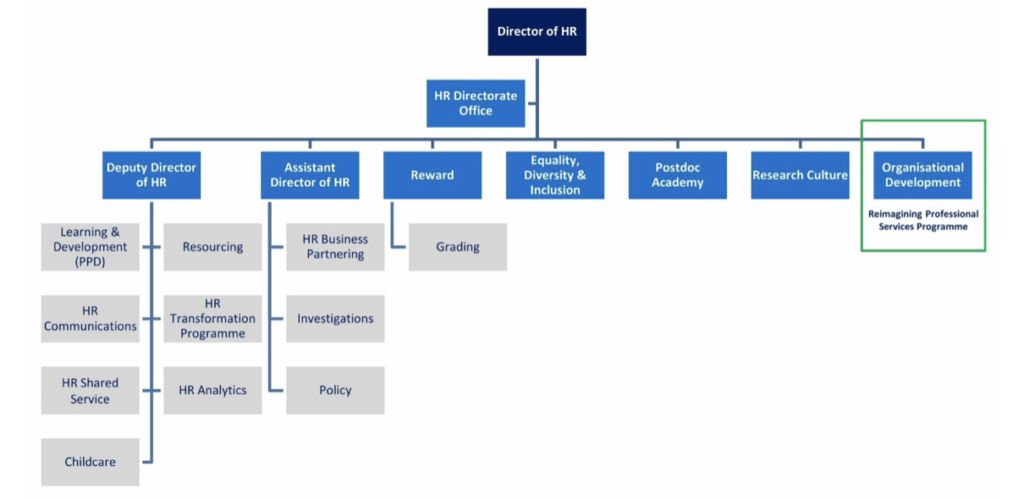
The administrator to faculty ratio speaks volumes about the priorities of modern academia. Since 2000, bureaucratic growth has outpaced academic growth in all UK universities.
In particular, the last two decades have seen very rapid expansion of Human Resources (HR) departments. Even as the number of academic jobs has stagnated or declined, the growth of HR is inexorable.
The hierarchy is topped by the Director of HR. At many Russell Group universities, the pyramid has many levels — the HR Deputy Director, the HR Assistant Director, HR Business Managers, Lead HR Business Partners, HR Business Partners, HR Administrators & HR Assistants lie below. It is normally a substantial corpus of individuals.
The HR Director wields considerable power and influence as a member of the senior management team. The salary depends on size of university, but will often exceed £120,000 for a large Russell Group university. (For example, Bristol University’s salary scale for senior professional services staff is here). A mid-ranking Lead HR Business Partner will earn about £70,000. HR salaries are therefore substantial, often exceeding those of senior academics.
The primary aim of any university’s HR or management team is to protect the university. Reputation is often a university’s most valuable asset. It may have been painstakingly built up over many years, or even centuries, yet it can be quickly ruined.
Universities try to present themselves as caring “people organizations”. They are not. HR is needed to resolve the contradiction between what a University really is and what it falsely presents itself as. There is much ‘care-washing’ with training courses on active by-standing or countering racism. The University normally behaves in the opposite way to what is described in the course.
HR creates a lot of unnecessary work. For example, suppose a researcher or staff member works, researches or studies under a bullying professor. If they complain about the bullying or harassment, then HR will ask the professor for his or her version of events. The professor denies any wrongdoing, arguing that any allegations are fabricated or distorted or misrepresented. So, the student or staff member will become embroiled in the grievance procedure, as any allegation is contested by counter-allegations. The university will now investigate both. Any complaint referred to HR rarely has a good outcome for anyone. What could have been resolved becomes an arduous and time-consuming battle as HR pitches one employee against another & sides with the professor.
Any good employer should be happy to have a meeting recorded for audit because obviously they will be running a fair investigation or disciplinary process. However, for whatever reason, University HR departments never allow recordings, even though this would be easy to implement. Instead, the meetings are transcribed (usually poorly) into “non-verbatim minutes”. The whole process of back-and-forth emails of poor minutes between the meeting participants to agree on the record of what happened is an enormous waste of time & money.
In some universities, HR has even branched — ominously — into investigations. Instead of having to rely on outside investigators to look into a serious matter like bullying or sexual harassment, University HR can now do its own “investigating”. Of course, this is the very model that took the Post Office to disaster in the Horizon scandal, with Post Office “investigators” browbeating the sub-Postmasters into admitting fraud. Many Universities are a Post Office Scandal waiting to happen.
Some facts are clear.
First, the larger the HR department, the worse the academic staff are treated.
Second, the worse the academic staff are treated, the more problems end up on HR’s desk
Third, the more problems, the louder the cries for more HR staff to deal with the increased workload
This is of course a feedback loop — the HR Death Spiral.
It guarantees that, even as academic jobs continue to diminish, HR will continue its merry expansion. And the University employee experience will continue to decline.
1 Comment
Saint-Just · 11 November 2024 at 20:48
Our university has been infiltrated.
HR, Legal, Registry office. All replete with parasitic careerists, draining our endowment with their fat cat salaries and corrupt contracts to old buddies in the consultancy and legal domains.
If we can purge the payroll of these parasites, that will give us all the resources we need in order to fix our university for the better.